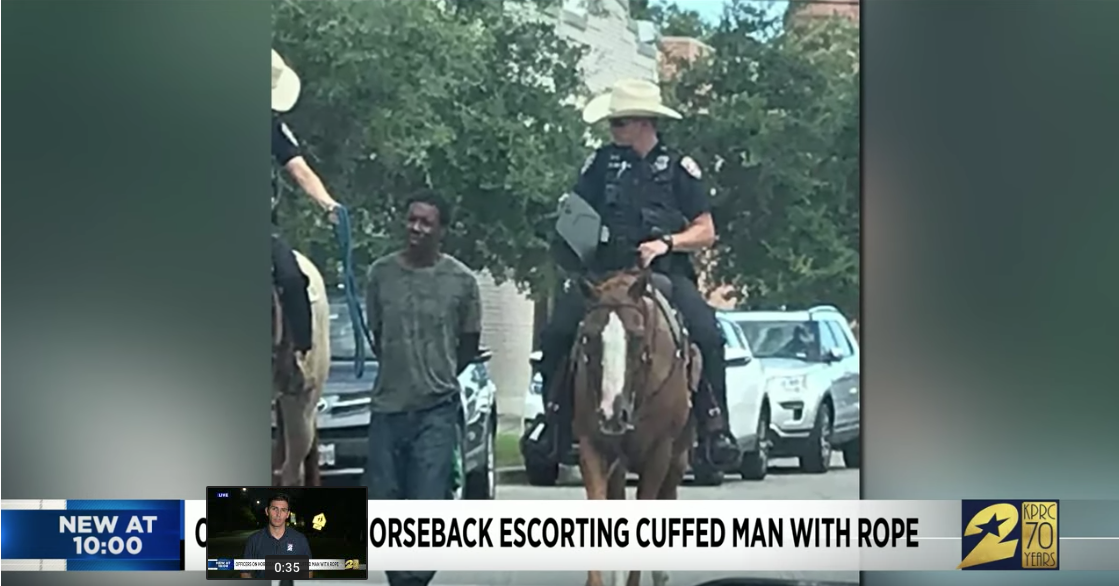Black Man Led on Rope by Police Is Mentally Ill, His Family Says
A photograph of the man’s arrest in Galveston, Tex., was shared widely on social media, conjuring for many images of slavery.
Relatives of a
black man who was led by rope down a street in Galveston, Tex., by two white police officers said Tuesday that the man has suffered from bipolar disorder and schizophrenia most of his life and regularly sleeps on the streets — struggles they said officers should have known about based on his criminal history.
The man, Donald Neely, 43, was arrested Saturday on a charge of criminal trespassing in a commercial neighborhood. The police said he had been warned several times before not to trespass in the area. When a police car was not immediately available, he was escorted by mounted police officers about four blocks to a nearby staging area, the Galveston Police Department said in a statement.
The scene was captured in a photograph by an onlooker and shared widely on social media, drawing national attention as it conjured for many images of slavery and mistreatment by whites of African-Americans.
Taranette Neely of Houston, Mr. Neely’s sister, said in an interview on Tuesday that Mr. Neely had been released 20 hours after his arrest.
“They should have never did what they did, put a black man in between two horsemen that are white,” she said.
Mr. Neely had been living mostly on the streets of Galveston for about five years and because of mental illness, had repeatedly resisted attempts by family members to bring him home, she said. Just three weeks ago, she said, Mr. Neely jumped out of a moving car driven by his brother who was trying to return Mr. Neely to his family.
Court records show that Mr. Neely had been arrested six times already in 2019 on misdemeanor criminal trespassing charges, part of what Ms. Neely said was a long history of interactions with the police. Court records show dozens of arrests for mostly low-level crimes dating back to the mid-1990s.
In recent years, Ms. Neely said, her brother had stopped taking his medication, and his mental state was deteriorating.
“They don’t care to know the whole story,” she said. “You're a criminal in their eyes. You’ll always be a criminal. Ain’t no redemption for you. You’re trash. And that’s how they treated him.”
Many residents of Galveston forcefully questioned the officers’ conduct at a community meeting on Tuesday organized by Vernon L. Hale III, Galveston’s police chief, and broadcast by local television stations. The Police Department has identified the two officers seen in the photograph only as P. Brosch and A. Smith. The officers could not be reached for comment.
Without fully naming the officers, Chief Hale said that one of them had been with the Police Department for four years and the other for two years.
At the meeting, Chief Hale, who issued an apology on Facebook on Monday night, said the Police Department was conducting a review of what had happened and that the two officers were not yet facing formal disciplinary action. He said that he would take the blame for what he called the officers’ “poor judgment.”
“If they want a pound of flesh, that comes from me, not my guys,” he said. “It’s my understanding that these officers — and until we have an opportunity to rest and talk and get to the root conversations, which we haven’t had an opportunity to do — they understand the perception of what people are seeing. They want people to understand that they were using tools they were provided to perform a job they were asked to do.”
Referring to the use of the rope escort, Chief Hale said the Police Department has “stopped the practice immediately.”
The method “is considered a best practice in certain scenarios, such as during crowd control,” the Police Department said in a statement Monday.
Calls on Tuesday to the Police Department and the Galveston County district attorney about the case were not immediately returned.
Mr. Neely’s family attended the community meeting on Tuesday with two lawyers and confronted Chief Hale over the image.
Chief Hale said he would not respond with specifics publicly given the possibility of litigation.
“I’m sorry, thank you for coming out,” Chief Hale told Mr. Neely’s family. “I’m sorry we had to meet under these circumstances. I can’t wait to sit at the table and talk to you one-on-one. We will set a meeting.”
Ms. Neely said that Mr. Neely has seven children living in Texas. The youngest is 11 years old and the oldest is 24 years old. She said that Mr. Neely was “sweet as a butterfly,” but that the death of their grandmother in 2006 had worsened his mental illness.
Ms. Neely said that after she saw the photograph of her brother, she called the Police Department to see if he was there, but he had already been released. She then drove down to Galveston and found him at a McDonald’s where Mr. Neely often spent time.
She said Mr. Neely knew his picture was getting national attention. She said he told her that he was not ready to come home and that he needed to “get his mind right.” Ms. Neely said on Tuesday evening she did not know where Mr. Neely was.
She said she hoped the attention would prompt police departments to “teach their officers to respect the homeless.”
“You don’t know their story,” she said. “Just because they’re out here on the streets, it doesn’t mean they’re not loved.”





